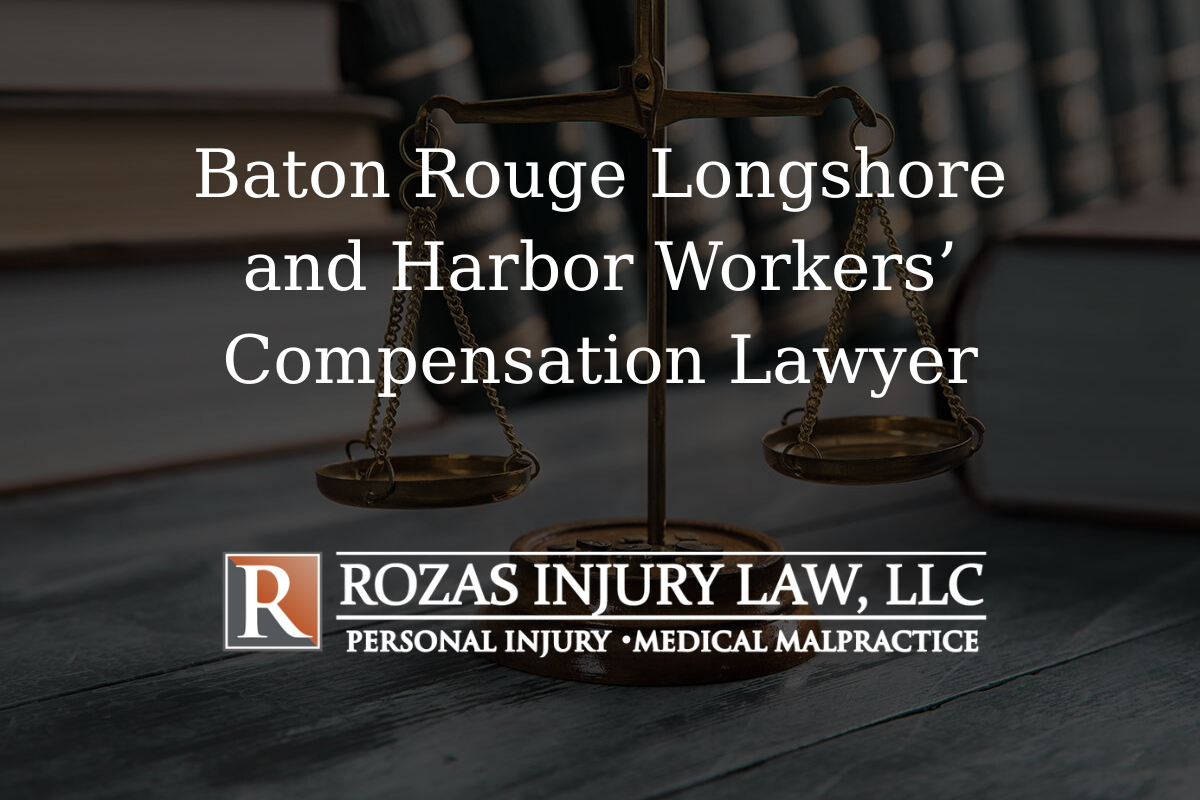Maritime workers perform some of the most physically demanding and dangerous jobs in the country. From loading cargo on docks to maintaining ships and supporting operations on oil rigs and the outer continental shelf, these workers face serious risks every day. When injuries happen in these environments, the Harbor Workers Compensation Act—a key federal law—provides essential protections for injured workers who may not qualify under the Jones Act.
If you are a longshore or harbor worker in Baton Rouge who has been hurt on the job, Rozas Injury Law, LLC can help you understand your rights and secure the workers compensation benefits you are entitled to. Our Baton Rouge longshore and harbor workers’ compensation lawyer has the legal experience and understanding needed to handle these highly specific claims.

Understanding the Harbor Workers Compensation Act
The Harbor Workers Compensation Act, officially known as the Longshore and Harbor Workers’ Compensation Act (LHWCA), is a federal law that provides compensation for lost wages, medical expenses, and death benefits to qualifying injured workers in maritime-related jobs.
The act applies to workers who are injured while performing maritime activity near or on navigable waters, including:
- Longshore workers
- Dock workers
- Shipbuilders and ship repair workers
- Maritime construction workers
- Employees involved in loading, unloading, or maintaining vessels
- Certain workers on oil rigs and platforms on the outer continental shelf
If you’re unsure whether your job qualifies under the LHWCA, a Baton Rouge attorney with in-depth knowledge of maritime law and federal workers compensation can help you determine eligibility.
What Does the LHWCA Provide for Injured Maritime Workers?
Under the Longshore and Harbor Workers Compensation Act, injured workers may be entitled to:
- Payment of reasonable medical expenses
- Wage replacement during periods of temporary total disability
- Long-term benefits if the injury leads to permanent disability
- Vocational rehabilitation assistance
- Death benefits to surviving family members
In many cases, workers covered by the LHWCA receive two-thirds of their average weekly wage while they are unable to work. These benefits are separate from state workers compensation law and follow their own unique process and filing deadlines.
Who Is Covered Under the LHWCA?
The LHWCA covers a broad range of employees in the maritime industry who may not qualify for Jones Act protections. These include:
- Longshore and harbor workers performing jobs on or near docks, piers, and shipping terminals
- Workers involved in shipbuilding or ship repair
- Oil rig employees who are not considered seamen but work on the outer continental shelf
- Dock workers who load and unload cargo
- Other maritime workers who perform qualifying tasks in connection with maritime activity
The law does not apply to office staff, crew members of vessels, or temporary employees. However, many employees who work near water or perform specialized maritime work do qualify. A lawyer experienced in longshore harbor workers compensation cases can help determine if your injury falls under federal coverage.
Filing a Longshore Harbor Workers Compensation Claim
Filing a claim under the Harbor Workers Compensation Act involves a different process than filing under state workers compensation. The federal claims process includes strict documentation, deadlines, and communication with the U.S. Department of Labor.
Our Baton Rouge law firm works diligently to assist workers through each step, including:
- Identifying whether you qualify under federal law
- Documenting your injury, treatment, and lost wages
- Managing deadlines and legal paperwork
- Dealing with the insurance company
- Appealing denied claims if necessary
If your job is based in Baton Rouge or nearby ports and you were injured while working on or near the water, our firm can assist with your LHWCA claim.
Injuries Commonly Covered by the LHWCA
Longshore and harbor workers often suffer serious injuries while performing physically intense tasks in unpredictable environments. Common injuries include:
- Spinal injuries or back trauma
- Crush injuries from heavy cargo or equipment
- Slip and falls on wet surfaces
- Injuries from malfunctioning tools or machinery
- Injuries related to unloading or loading vessels
These injuries can result in long-term medical treatment, rehabilitation, and lost wages. In some tragic cases, they may result in death, leaving family members to pursue survivor benefits under the law.
Outer Continental Shelf and Extended Coverage
Many workers on oil rigs and offshore platforms based near Baton Rouge, Louisiana are covered by an extension of the LHWCA known as the Outer Continental Shelf Lands Act. This law expands federal protections to employees engaged in extracting natural resources, such as oil and gas, from the sea floor.
If you were injured while working on a fixed platform or supporting operations tied to the outer continental shelf, this extension may provide your only path to obtain compensation under federal law. Our attorneys are experienced in handling claims under this extension and know how to fight for the full range of benefits available to injured workers in these roles.

Why Choose Our Baton Rouge Law Firm for Longshore and Harbor Workers Compensation Cases?
- Extensive experience with maritime injury and federal workers compensation law
- Representation of injured dock workers, longshore workers, and offshore employees
- In-depth knowledge of the claims process under the LHWCA
- Clear, professional legal representation for workers and families
- Free consultation to help you understand your legal rights
Rozas Injury Law, LLC serves clients throughout Baton Rouge and southern Louisiana. We work diligently to ensure every injured worker receives the benefits they deserve under longshore and harbor workers compensation law.
Learn more about Baton Rouge Longshore and Harbor Workers’ Compensation Lawyer services. Call Rozas Injury Law, LLC at 225-343-0010 to schedule your free, no-obligation consultation. You can also reach us anytime through our contact page. Let us help you take the first step toward justice and peace of mind.
FAQ: Longshore and Harbor Workers Compensation in Baton Rouge
Who qualifies for benefits under the Longshore and Harbor Workers Compensation Act?
Workers involved in maritime jobs near navigable waters—such as dock workers, longshoremen, and some offshore employees—may qualify for benefits under the LHWCA. Crew members and office workers are typically not eligible.
How is this different from state workers compensation law?
The LHWCA is a federal law that provides benefits for maritime workers, while state workers compensation laws apply to land-based injuries. If your job involves maritime activity, you may fall under federal rather than state protection.
What benefits can I receive after an injury under the LHWCA?
Injured workers may receive medical expenses, lost wages (typically two-thirds of their average weekly wage), vocational rehabilitation, and death benefits for eligible family members.
Can I file an LHWCA claim if I work on the outer continental shelf?
Yes. The Outer Continental Shelf Lands Act extends LHWCA coverage to workers on fixed offshore platforms and rigs involved in extracting natural resources.
What should I do after a maritime injury in Baton Rouge?
Seek medical treatment, report the injury to your employer, and speak with a Baton Rouge longshore and harbor workers’ compensation attorney as soon as possible to begin the filing process and protect your rights.




